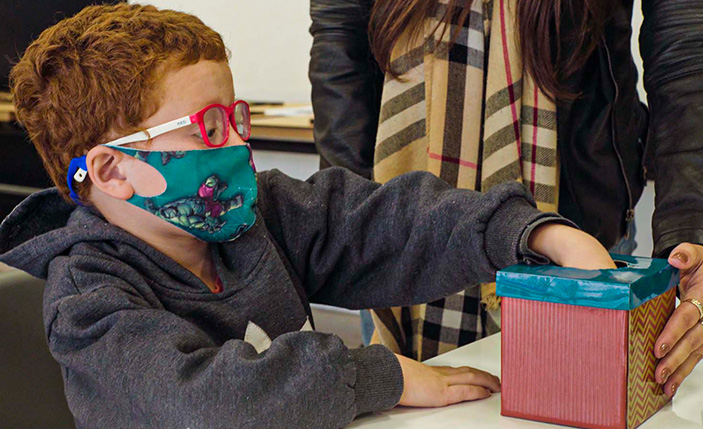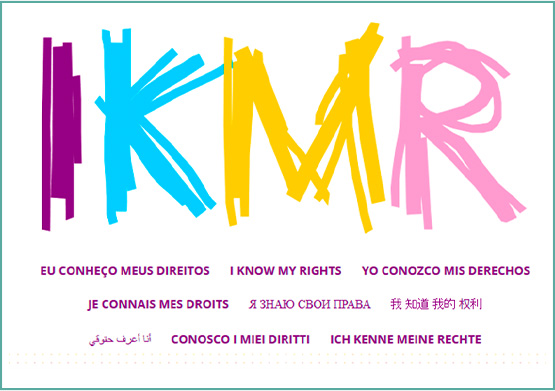



Banco do Brasil Foundation dialogues and carries out actions with various audiences, preferably people in situations of social vulnerability, seeking to promote the improvement of the quality of life of all Brazilians, without any distinction.
We highlight some initiatives and projects supported in 2021 that reaffirm our appreciation of diversity, equality and inclusion:
In the selection of the finalist social technologies for the 2021 edition, a bonus of 5% was granted to the total score obtained for initiatives that promote the protagonism and empowerment of women.
Among the winners of this 11th edition, we had the Social Technology “Codesign between 21st century designers and visually impaired people: processes and products” which defines codesign methods, techniques and tools applied to the inclusion of visually impaired people in the design process of architecture, urbanism, landscaping and interiors, generating processes and products with characteristics of incremental and/or disruptive innovation. The methodology also helps visually impaired people to get to know the city and public spaces, guaranteeing freedom of movement and the right to come and go.

With determination and persistence, the Chapada Institute of Education and Research - Icep was born more than 20 years ago, in Chapada Diamantina (BA), with the dream of transforming the lives of children, guaranteeing them the right to a quality public education. At that time, the challenges were diverse: scarce resources, there had no pedagogical coordinators in schools and education networks operated in a disjointed way. It was then that the educator Cybele Amado had the idea of bringing together educators and managers for promoting a movement of collaboration around this purpose.

In this way, the Social Technology “Collaborative Territories for Education”, which operates on three pillars: in the continuous training of educators, managers and technical teams of municipal networks; in the production of teaching materials and municipal school curriculum documents; and in the sociopolitical mobilization of social actors for the permanence of good educational practices and policies in the municipalities.
Educational technology articulates with the public, private and civil society sectors; the exchange of experiences between networks, with an emphasis on collaboration and the implementation and strengthening of the municipal policy of continuing education linked to professional practices. The initiative also promotes the evaluation and permanent monitoring of learning. “In this methodology, it is essential that the community and the educators legitimize all the strategies that are intended to beapplied in order to create an educational environment in each city”, explains Elisabete Monteiro, President and Pedagogical Director of Chapada Institute.
Currently, the Icep network encompasses 285,000 students, 2,600 schools and more than 15,000 educators. The technology is widely applied in all municipalities where Chapada Institute operates. It currently covers about 30 municipalities in Bahia, in four territories: Chapada Diamantina and Regions, South Coast, Agreste North Coast, Salvador and metropolitan region. The territories of Chapada Diamantina and Regions and Agreste North Coast work in collaboration through the Education Development Arrangements - ADE. The technology is also expanding in the states of Alagoas and São Paulo.
BB Foundation and the association I Know My Rights - IKMR formalized a project for the reception and integration of refugee children and adolescents.
IKMR is an association created in 2012 based on the growing need for integration of refugee children and adolescents in Brazil, considering the specific needs of this age group. Since 2017, it has moved its headquarters and activities to São Paulo (SP), due to the greater concentration of refugee public and better conditions for attracting investments in the city.

Considering the importance of affective integration and the psychosocial development of these young people, the institution's activities cover the mapping of refugee children and families in the city of São Paulo and the carrying out of activities for psychopedagogical support and social assistance in general.
The project's specific objectives are to assist in the adaptation of refugee children and adolescents to the Brazilian sociocultural reality and to improve the socioeducational development of refugee children and adolescents, thus contributing to the improvement of the inclusion process of this public. It is estimated that 100 young people and adolescents will be covered by this project.


